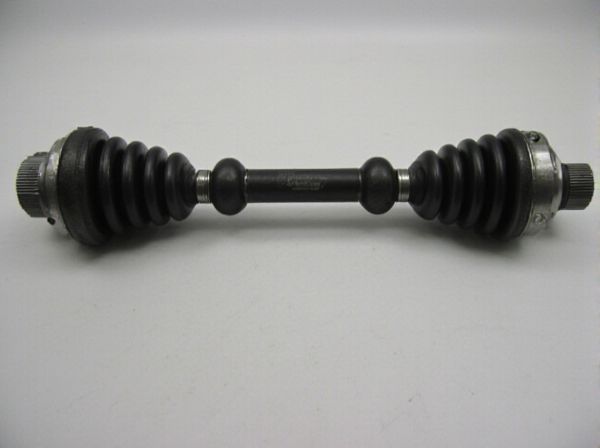
Photo illustration: Slip Yoke Driveshaft vs Fixed Yoke Driveshaft
Slip yoke driveshafts allow for axial movement, accommodating changes in length as the suspension moves, which helps prevent drivetrain binding and damage. Fixed yoke driveshafts provide a more secure connection with less play, improving strength and durability but requiring careful alignment to avoid vibrations. You should choose between slip yoke and fixed yoke driveshafts based on your vehicle's suspension setup and the balance between flexibility and rigidity needed.
Table of Comparison
| Feature | Slip Yoke Driveshaft | Fixed Yoke Driveshaft |
|---|---|---|
| Design | Allows axial movement with a slip yoke for length adjustment. | Rigid connection; uses a fixed yoke with a slip joint or CV joint elsewhere. |
| Flexibility | High flexibility; compensates for suspension movement. | Less flexible; relies on other components for motion adjustment. |
| Durability | More wear-prone due to sliding parts. | Generally more durable with fewer moving sliding components. |
| Maintenance | Requires regular lubrication and inspection of slip yoke. | Lower maintenance, but joint seals must be checked. |
| Application | Common in rear-wheel-drive trucks and 4x4 vehicles. | Used in high-performance and heavy-duty applications. |
| Cost | Typically less expensive to produce. | Usually higher cost due to complex design. |
Introduction to Driveshaft Yoke Types
Slip yoke driveshafts feature a splined yoke that allows axial movement, accommodating changes in drive shaft length as the suspension flexes or the vehicle moves. Fixed yoke driveshafts have a rigid, non-movable yoke, providing a secure connection but requiring precise alignment to avoid vibration. Each yoke type influences drivetrain performance, durability, and ease of maintenance depending on the vehicle's design and application.
What Is a Slip Yoke Driveshaft?
A slip yoke driveshaft features a splined shaft that slides in and out of the transmission or transfer case, allowing for changes in driveline length due to suspension movement or drivetrain flex. This design accommodates shifts in distance between the transmission and the rear differential, helping maintain driveline stability and preventing damage. It is commonly used in vehicles with solid rear axles and rear-wheel-drive setups to manage torque transfer efficiently while allowing for suspension articulation.
What Is a Fixed Yoke Driveshaft?
A fixed yoke driveshaft features a yoke rigidly attached to the shaft, creating a solid connection with the transmission or differential. This design minimizes driveline vibrations and offers improved stability and strength for heavy-duty applications. Fixed yoke driveshafts require precise alignment and are commonly used in trucks and off-road vehicles to ensure durability under high torque loads.
Key Differences Between Slip Yoke and Fixed Yoke
Slip yoke driveshafts feature a telescoping mechanism that allows for axial movement, accommodating changes in driveline length and reducing stress on the transmission and differential during suspension travel. Fixed yoke driveshafts lack this sliding capability, providing a more rigid connection that enhances strength and reduces the risk of slipping but requires a separate slip joint or slip yoke elsewhere in the driveline. The key differences lie in their design flexibility for movement, impact on driveline stress, and suitability for various vehicle suspension setups.
Performance and Functionality Comparison
Slip yoke driveshafts offer enhanced driveline angle compensation, improving performance in vehicles with variable suspension travel by allowing axial movement and reducing drivetrain vibrations. Fixed yoke driveshafts provide a more rigid connection, enhancing torque capacity and overall durability but may transmit more vibration due to limited flexibility. In terms of functionality, slip yokes are ideal for off-road and lifted vehicles requiring suspension articulation, whereas fixed yokes suit high-torque applications demanding increased reliability and reduced maintenance.
Advantages of Slip Yoke Driveshafts
Slip yoke driveshafts offer superior flexibility and ease of installation compared to fixed yoke driveshafts, allowing for smooth movement during suspension travel and axle articulation. They can absorb drivetrain vibrations more effectively, reducing wear on other components and improving overall vehicle longevity. Slip yoke designs also simplify maintenance by enabling straightforward removal and adjustment without disassembling the entire drivetrain.
Benefits of Fixed Yoke Driveshafts
Fixed yoke driveshafts offer enhanced durability and reduced maintenance compared to slip yoke driveshafts due to their rigid connection, which minimizes vibration and wear. Their design provides improved torque transfer and stability, making them ideal for high-performance vehicles and heavy-duty applications. Fixed yoke driveshafts also enhance driveline alignment, leading to smoother operation and extended component lifespan.
Common Applications for Each Driveshaft Type
Slip yoke driveshafts are commonly used in vehicles with rear-wheel drive and four-wheel drive systems that require variable length adjustment, such as trucks and SUVs with suspension travel. Fixed yoke driveshafts are typically found in performance vehicles and off-road applications where a solid, fixed connection provides enhanced strength and durability under high torque loads. Both driveshaft types serve critical roles in transmitting power from the transmission to the differential, tailored to specific vehicle demands and operational environments.
Maintenance and Durability Considerations
Slip yoke driveshafts require regular lubrication to prevent wear and maintain smooth movement, while fixed yoke driveshafts typically need less frequent maintenance due to their rigid construction. Durability-wise, fixed yoke driveshafts offer enhanced longevity and resistance to vibrations, making them ideal for heavy-duty applications. Slip yokes, though easier to service, may experience faster wear under high-stress conditions and require more frequent inspection.
Choosing the Right Driveshaft Yoke for Your Vehicle
Choosing the right driveshaft yoke depends on your vehicle's suspension setup and intended use, as slip yoke driveshafts allow for easier adjustment of shaft length during suspension movement, making them ideal for vehicles with significant travel or lift kits. Fixed yoke driveshafts provide a more secure, rigid connection, reducing vibrations and enhancing durability for high-performance or heavy-duty applications. Assess your vehicle's requirements, including axle movement, torque demands, and maintenance preferences, to select the yoke type that ensures optimal driveline reliability and efficiency.
 caratoz.com
caratoz.com